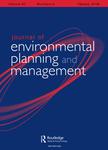版权所有:内蒙古大学图书馆 技术提供:维普资讯• 智图
内蒙古自治区呼和浩特市赛罕区大学西街235号 邮编: 010021

作者机构:Univ Leuven Res Inst Work & Soc Leuven Belgium
出 版 物:《JOURNAL OF ENVIRONMENTAL PLANNING AND MANAGEMENT》 (J. Environ. Plann. Manage.)
年 卷 期:2018年第61卷第9期
页 面:1469-1486页
核心收录:
学科分类:0830[工学-环境科学与工程(可授工学、理学、农学学位)] 0201[经济学-理论经济学] 08[工学] 0833[工学-城乡规划学]
主 题:sustainability transitions environmental taxation multi-level perspective multi-phase perspective policy mix
摘 要:The burgeoning literature on sustainable transitions links persistent environmental problems to the functioning of socio-technical systems. Conventional policy instruments, such as environmental taxation, are often rejected by transition scholars but in-depth studies on their potential are scarce. This paper explores the potential of the instrument of environmental taxation for influencing sustainability transitions. The multi-level perspective and the multi-phase perspective from transition thinking and the social practices approach are combined with the environmental economics theories of Pigou and Coase. Our analysis shows that the highest impact of regulatory taxation will be realised at the end of the take-off phase and in the acceleration phase of a transition. Although important barriers exist and many conditions apply, regulatory environmental taxation, especially as part of a smart policy mix, has more potential for contributing to sustainability transitions than hitherto assumed.